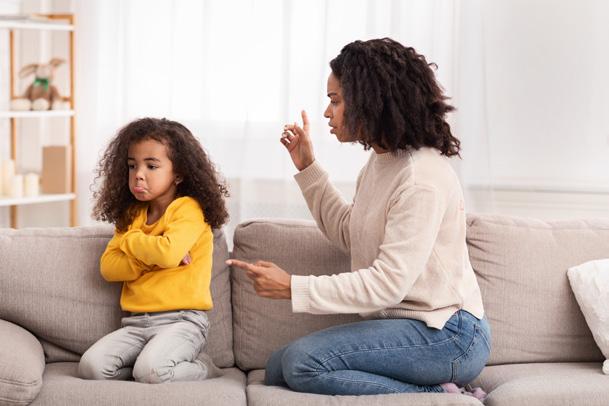
5 minute read
Logan City School District: Help! My Child is Angry with Me
EDUCATION UPDATE
Help! My Child is Angry with Me!
Advertisement
FRANK SCHOFIELD superintendent, Logan City School District
The winter months bring unique opportunities for families to spend time together. The cold weather often keeps us indoors more, and many holidays can bring extended family members into our homes. These increased interactions are hopefully positive, but increased time together can also lead to frayed nerves and increased opportunities for conflict (maybe you’re thinking about the one time you tried to play Monopoly as a family), and that conflict can lead to children being frustrated, or even angry, with their parents.
As most adults know, a child being angry with their parent is nothing new, nor is it limited to the winter months. But it can be difficult as a parent to manage a child’s anger in ways that model how people manage their emotions in healthy relationships. So, what can you do as a parent when your child is angry with you?
Dr. Chinwé Williams, a licensed professional counselor (LPC), offers the following five suggestions a parent can use when working with a child who is angry.
TAKE A PAUSE BREAK. It’s difficult to remain calm when your kid is exploding with anger. That’s because anger has the effect of pushing another person away. Additionally, tantrums trigger our body’s stress response system: fight, freeze, or flight. When being disrespected, it’s natural to want to fight back, but it doesn’t help. Author L.R. Knost suggested, “When little people are overwhelmed by big emotions, it’s our job to share our calm, not join their chaos.”
While challenging, it’s important to demonstrate kindness even through disagreements and frustrations. To do so, we must calm our emotional brain by engaging our logical brain. If necessary, step away for a few minutes (or hours) to decompress.
Allow yourself time to move past your initial reaction so that you can move toward a more thoughtful response. Managing your own upset is one of the best ways of teaching our kids to manage theirs.
HELP THEM TO EXPLORE WHAT IS UNDERNEATH THE SURFACE. Anger is a natural response to pain and often covers up really big hurts. Anger can be an immediate response to something that feels threatening in the moment, or it can build up over time. For example, angry kids and teens often report feeling ignored, unimportant, or devalued.
Teaching children to manage powerful emotions is a valuable life skill. Anger can stem from a very deep place that is seeking acknowledgment — and expression. Respond by acknowledging their emotion while holding a boundary: “It’s OK to feel angry, but it’s not OK to be disrespectful, slam doors, or pull your sister’s hair.” Or, “I understand that you are upset with me because you want to sleep over at Lisa’s house. My answer is firm, but when you’re feeling calmer, we can discuss the reasons for my decision.”
COMPROMISE WHERE YOU CAN. I once heard a parenting expert advise against compromising with upset kids because, “We don’t negotiate with terrorists.” While I understand the general sentiment (sort of), I think it’s more helpful to connect wherever you can. When your kid or teen takes the time to explain their point of view in a thoughtful and respectful manner, welcome it! And thank them afterwards. While you undoubtedly have many valid points, under pressure, your child is likely to reject new (and helpful) information instead of wrestling with it.
When your child is calm, consider leading with, “Before anything else, I want you to know that I love you.” The goal here is not to compromise continued on next page …
… continued from previous page your views or beliefs, but to model for your kids the willingness to engage in tough conversations. After all, iron sharpens iron.
ENCOURAGE HEALTHY EXPRESSION. When kids believe they have been treated unfairly, they have a hard time controlling their hostility. School-aged kids are better able to demonstrate higher levels of selfcontrol compared to toddlers or preschoolers. However, self-management skills are beneficial at any age. In fact, research suggests that a child’s ability to regulate his or her emotions is a more valid measure than IQ in predicting academic success.
Younger kids utilize make-believe play to help them to self-regulate. Through play, children “rehearse problems” with peers, thereby developing and enhancing their social, emotional, and conflict resolution skills.
If you are the parent of an angry teen, you know the struggle of communicating through contempt. Encourage them to self-regulate but, tempting as it is, avoid screaming, “Go to your room and take a few breaths!” The point here is to help your teen to express their aggravation productively. Adults can coach teenagers to be self-disciplined by calmly asking for what they need. Helpful phrases include, “Mom, can we change the subject? I’m getting upset.” Or “Dad, I need to leave the room and process my feelings.”
RELEASE CONTROL AND STAY CONNECTED. During times of conflict, parenting can feel like an endless game of setting and enforcing limits—which isn’t fun for anyone. It’s tempting to squash our kids’ resistance by exerting control or dominance. Attempting to control our kid’s behavior might feel good in the moment, but often increases tensions. Instead, focus on relationship building. According to communications expert Melodie Stanford Martin, two primary goals in any conflict are: 1. Protect the relationship, and 2. increase the probability for understanding on both sides. Statements such as, “You’re making a good point,” and, “I never thought of it in that way,” are powerful ways of joining with your child and boosting connection.
Every family faces the challenge of managing anger and frustration, while hopefully still finding ways to communicate effectively. When we focus on connecting with the other person, instead of controlling their response to us, we will have a better chance of managing the negative emotions of the situation while ensuring the relationship remains safe and intact.













